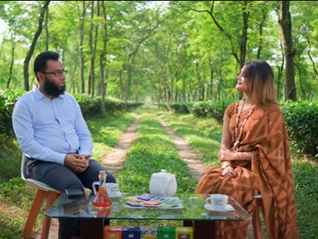Tea cultivation creates 25,000 jobs in 5 northern districts
- Dr. Mohammad Shameem Al Mamun
- Apr 12, 2025
- 3 min read
The rapidly boosting “small-scale gardening-basis” tea cultivation has created jobs for more than 25,000 rural people, including 15,000 women, in five northern districts of the Kartoa Valley ecological zone. Talking to BSS, President of Bangladesh Small Tea Garden Owners’ Association Amirul Haque Khokan said small-scale gardening-basis tea farming has ushered in a new hope to change the fortune of local farmers in these northern districts.
“More than 25,000 unemployed people, including 15,000 women, are earning well through farm-activities and plucking tea-leaves to lead better lives even during the coronavirus pandemic in the valley,” he said. The labourers are earning Tk500-600 as daily wages in cash by plucking green tea-leaves in groups of 10 to 20 men and women to lead a solvent life. “Though the rural women passed through hard times even an era ago amid abject poverty, they have come out of the vicious cycle of poverty now to lead better lives with a dream of a better future for their children,” Khokan added.
Officials of Bangladesh Tea Board (BTB) said the Kartoa Valley ecological zone comprises Panchagarh, Thakurgaon, Dinajpur, Nilphamari and Lalmonirhat districts.
“The valley witnessed an all-time record 9.6 million kg of made-tea production last year against 8.47 million kg in 2018 and 5.44 million kg in 2017,” said Senior Scientific Officer at Bangladesh Tea Research Institute Dr Mohammad Shameem Al Mamun. Mamun, also project director of the Northern Bangladesh Project of BTB, said owners of nine registered and 19 unregistered gardens and 6,558 small holders cultivated tea on 8,681 acres of lands producing 46.9 million kg of green tea leaves in 2019 in the valley. With continuous expansion of tea cultivation on “small-scale gardening-basis”, more jobs are being created every year for thousands of tea workers, mostly women, in the valley. “The small-scale gardening-basis tea farming continues expanding since the launch of the ‘Expansion of Small Holding Tea Cultivation in Northern Bangladesh Project’ in 2015 to bring more 500 hectares of land under tea farming by 2020,” Mamun added.
Talking to BSS, Vice-President of Panchagarh Chamber Mehedi Hasan Khan Babla said the flourishing tea-based agriculture sector accelerates women empowerment by assisting women in contributing to their families for living with dignity. “More than 15,000 women tea workers, including unemployed female youths, housewives, widows and divorcees, are earning better wages by working in the fast growing tea sector to improve their livelihoods in the valley,” Babla said.
Workers living well by working in tea gardens even amid the pandemic
Like other tea growers, Shahinur Rahman of Buraburi village in Tetulia upazila of Panchagarh said he started “small-scale gardening-basis” tea cultivation on his plain land in 2016. “I am cultivating tea on 5.50 acres of land and selling green tea-leaves to tea processing companies to earn well,” Rahman said, adding that many men and women workers were working in his tea fields and earning better wages.
Talking to BSS, women farm-labourers Aleya Khatun, Kalpona Begum, Selina Hembrom and Gokul Hasda of Buraburi village said they were earning Tk500-600 as daily wages by plucking green-tea leaves. Aklima Begum of Moynaguri, Phuli Khatun of Kandaligoach and Morium Begum of Guchchhogram villages in Tetulia upazila said they were living well by working as labourers in tea gardens even amid the coronavirus pandemic. “After forming groups of 15 to 20 women labourers to pluck green-tea leaves and share wages equally, we started getting double wages — between Tk500 and Tk600 daily — compared to five-six years ago,” said labourer Kalpona Begum.
Source: DhakaTribute









Comments